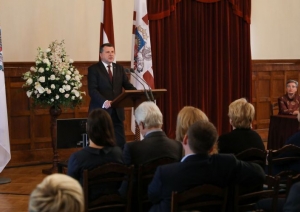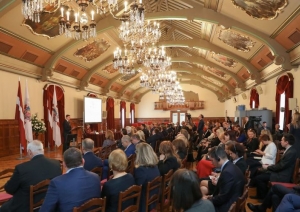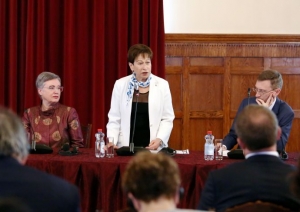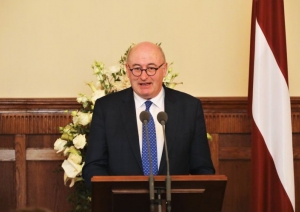When opening the event, President of Latvia Raimonds Vējonis stressed the need for Europe to change constantly, “The European Union must serve its citizens, brake away from the world of bureaucratic structures and adapt more quickly to various changes, maintain unity and be solid to face internal and external challenges.”
The President of Latvia noted that on May 1 we celebrated 15 years since Latvia joined the European Union (EU) and returned fully to the family of European democracies. “Today, Latvia’s membership in the EU has become self-evident. We are full-fledged members of the EU family, we have similar challenges, and need to respond to them,” emphasised Raimonds Vējonis.
The President of Latvia stated that EU citizens wished to see a fairer Europe, where we can compete fairly in agriculture and in several sectors of services. “We in Latvia wish to see a fairer Europe, and we will also advocate that during the negotiations on the next EU multiannual budget. However, according to the report recently presented to the European Parliament on the major trends that will affect the EU by 2030, we will have to take into account other even greater processes. These are three processes: climate change, demography, and urbanisation. They will affect every strategy, proposal, and decision that will be forwarded at both national and EU level.”
In its turn, regarding the upcoming elections to the European Parliament, the President of Latvia pointed out in his address that Latvia was joining the initiative of the Federal President of Germany of a joint call of the Presidents of EU Member States on the citizens to be active at the elections to the European Parliament. This joint call of the 21 EU MS Presidents will be published on the Day of Europe on May 9 by highlighting the issues of migration, terrorism, economic globalisation, and climate change.
Vice-President of the European Commission Valdis Dombrovskis and Prime Minister Krišjānis Kariņš also took part in the opening of the conference “15 out of 100. The 15 Years of Latvia’s Membership in the European Union”.
In his address, Vice-President of the European Commission Valdis Dombrovskis drew attention to the major challenges the EU faced the ability to be united, have one voice, and find answers to difficult questions among other things. “The share of Europe in the global economy and the number of global population is gradually decreasing. Therefore, we will find solutions to future challenges only by joining efforts, and we will keep our influence in the world only by speaking one voice. This applies to both the economy, foreign policy, and security policy,” stressed Valdis Dombrovskis.
While talking about the 15 years of Latvia as an EU Member State, the EC Vice-President pointed out that Latvia used its opportunities by demonstrating one of the fastest paces of real convergence in productivity growth together with the other Baltic States. At the end of his address, the EC Vice-President said, “Latvia must be ready to adapt rapidly to the ever-changing situation in the world while being able to take care of the national security and increasing well-being of its population at the same time. A strong and decisive Europe is also in Latvia’s interests. At the same time, Latvia’s voice must be influential and well heard, and it is important that Latvia remains at the heart of the EU.”
The Chancery of the President of Latvia, the Latvian Association of Political Scientists, the Institute for European Policy Studies, the European Council on Foreign Relations, and the Elcano Royal Institute organised the international conference “15 out of 100. The 15 Years of Latvia’s Membership in the European Union”.
The Conference aimed to update and discuss the impact of Latvia’s Membership in the EU on the national development, achievements, and challenges, as well as to discuss the future of European integration that occurs in all the EU Member States. During the first part of the Conference, the conclusions of the study “15 out of 100: Latvia’s Membership in the European Union” were presented. Its authors, Professor of the University of Latvia and Member of the Fiscal Discipline Council Ms Inna Šteinbuka and Professor of the Department of Political Science of the University of Latvia Ms Žaneta Ozoliņa stated that Latvia was successful in participating in EU-level decision-making process policy-making process at various levels. The impact of global challenges on the Member States and the EU as a whole is now growing. Therefore, comprehensive cross-sectoral solutions are needed to address the diverse challenges. For Latvia, it might be worth discussing a new institutional governance model of EU policy. Considering the increasing discussions in the EU Member States, including on development models of future EU and policy reviews, it would be useful for Latvia to consider elaborating a strategic document that would define a national framework for action in the EU. Meanwhile, Head of the Market and Public Opinion Research Center SKDS Mr Arnis Kaktiņš presented the poll of the attitudes of the population towards Latvia’s membership in the EU to the audience. The first part of the Conference ended with a panel discussion on the progress of Latvia and the EU towards prosperity.
European Commissioner for Agriculture and Rural Development Mr Philip Hogan opened the second part of the Conference by pointing out that Latvia’s accession to the EU was its coming home to Europe and that Latvia’s membership of the EU enriched it. The Commissioner indicated that EU membership increased the sovereignty of small and medium-sized countries. The Member States are members of the largest and most powerful trading bloc in the world, where they have each other’s back. The Conference was closed by a panel discussion on whether the EU needed a new governance model. Parliamentary Secretary of the Ministry of Foreign Affairs Dr Zanda Kalniņa-Lukaševica, Director of the Elcano Royal Institute Dr Charles Powell (Spain), as well as Deputy Director of the Latvian Institute of International Affairs Mr Kārlis Bukovskis, and Chairperson of the Board of Think-tank CERTUS and Associated Professor Daunis Auers participated on the panel.









